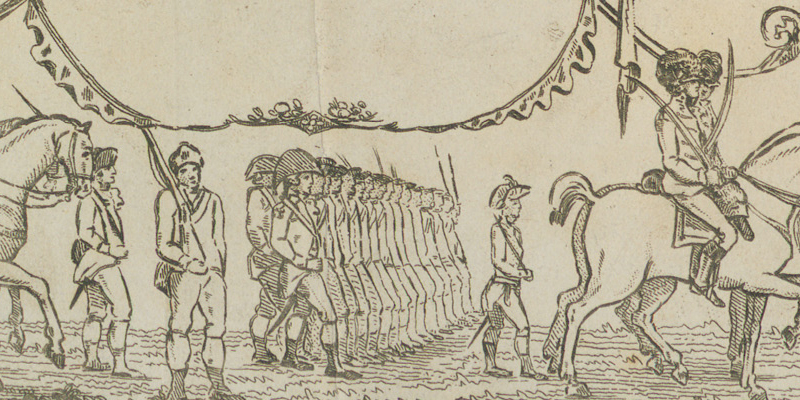The Irish Wars: The Irish Against Napoleon (Lecture 2/3)

Detail from 'A view of the Engagement at Vinegar Hill, June 21st 1798'
'France's Plans for Ireland: Invasions, 1796-98'
- Get help accessing events on Crowdcast
In the 18th century, Royalist France had made several plans to invade Britain by first landing troops in Ireland. The threat had been very real in both the Seven Years' War and during the American Revolution - an ambition which Revolutionary France adopted with gusto.
British rule in Ireland was resisted and resented by both militant Republican Roman Catholics and dissident Protestants in the shape of Presbyterians, Wesleyans and others. They combined into the United Irishmen, a numerous, armed, clandestine force led by, amongst other, Theobald Wolfe Tone. With a proper, strategic grasp of the situation, Tone sought French help which was promised but was never muscular enough or sufficiently organised to be effective.
However, even the threat of a French landing in Ireland was enough to make the Crown and Government tremble. Britain was fighting for her very existence across the globe, while desperately trying to put enough troops together to challenge France in the Low Countries and right up into Holland. Seeing Britain stretched tightly everywhere, mutinies in the Royal Navy, seething discontent and the lack of a standing garrison in Ireland, invasion forces were made ready.
Foul weather put paid to the first attempt in December 1796, another was sent to the bottom at Camperdown by Admiral Duncan in October 1797. Then, after the Rebellion of 1798 had been all but strangled in Counties Down and Wexford by June, the French landed a handful of men under Humbert at Ballina in late August.
Local forces flocked to the French colours and a Republic was declared, but it lasted only 12 days before being smashed at Ballinamuck on 8 September. Then, another expedition with Tone aboard entered Lough Swilly in October, but there met the Royal Navy with bloody consequences. French hopes of conquest died just as surely as Wolfe Tone did, when he slit his own throat in prison in Dublin in November.
Patrick Mercer OBE will explain the Protestant Wind, the maxim of always keeping ‘a pike in the thatch’ and the Castlebar Races as he outlines France's plans to thrust a knife into embattled Britain's back.
Become a Member
Enjoy exclusive Members events, subscription to 'Muster Magazine', free entry to exhibitions, exclusive curatorial tours and historical walks.
